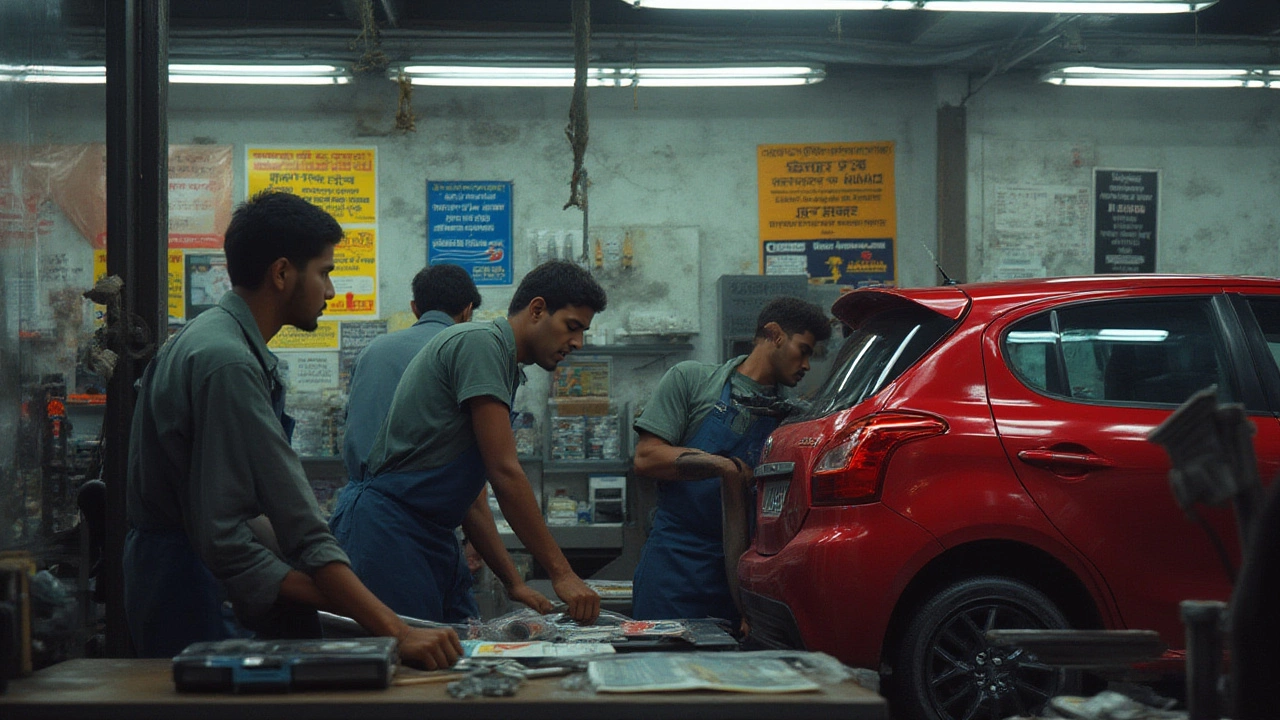Straight Pipe Exhausts: Reasons Behind Their Ban and Legal Issues
 Jul, 12 2025
Jul, 12 2025
Imagine you're standing on a city street and you hear it: a wall-shaking, deep bellow from a car two blocks away. Your first thought probably isn't "Oh, what a lovely sound." Odds are, it's a car with a straight pipe exhaust blasting past, making everything and everyone jump. That's exactly why so many places have outlawed them. People love the noise behind the wheel, but not so much when they're outside trying to sleep, work, or just not go deaf. So, why is slapping on a straight pipe—an exhaust mod with zero filters and almost no silencing—such a big problem in the eyes of the law? Dive into this rabbit hole, and you'll see it's not just about peace and quiet. It’s about air quality, safety, and the fine line between fun and nuisance.
What is a Straight Pipe Exhaust and Why Do People Want It?
Let's break it down. A straight pipe exhaust is pretty much what it sounds like—a straight tube that lets exhaust gases escape without any kind of muffling, cleaning, or restriction. Most cars these days trap harmful stuff in the catalytic converter and dampen sound with a muffler before the fumes escape. A straight pipe throws all that in the trash. Basically, the gases flow right from the engine to the tailpipe, and that means two obvious things: way more noise and a lot less pollution control.
Car enthusiasts, especially those who crave raw engine sounds, are drawn to straight pipes because of the aggressive note they produce. You hear every bit of the engine's personality. And yes, removing the restrictive parts can shave off a little weight and might, in some older cars, give you a tiny performance bump. There’s no real backpressure to worry about, so in theory, the engine breathes easier. But here's the catch—modern engines are designed with emissions and noise restrictions in mind, so any gains are usually minor. And most of the time, the trade-off is just not worth the hassle. Still, a lot of folks like to push the boundaries for the sake of being loud, different, and, let’s be honest, to turn some heads.
Now, is it all about the sound? Not really. Some argue that straight piped cars can scare off wildlife less due to the pitch of the noise, which is a real stretch. Others claim they're easier to maintain since there are fewer parts to break. That's like removing your shoes because it's faster to just walk barefoot—sure, but the road gets rough, fast.
Ever seen videos of cars spitting fire? Straight pipes are partly to blame. Without a catalytic converter, unburnt fuel sometimes ignites in the hot exhaust, shooting out flames. Fun for YouTube—illegal and dangerous in real life. Let's not forget the environmental impact. According to the U.S. Environmental Protection Agency, removing emission controls can make a vehicle emit up to 40 times more pollution. That’s not just bad news for trees; it puts more smog right into our lungs.
If the allure is so strong, why do so many countries ban or restrict them? The next section gets into the nitty gritty of what the rules really say.
The Legal Side of Straight Pipe Exhausts
The thrill of a straight pipe quickly fades when the blue and red lights flash behind you. In most places, rolling through town with one is just asking for a ticket—or worse. But what exactly makes them illegal? There's no global law against them, but if you live in the United States, Canada, UK, Australia, or pretty much any developed country, your car needs to meet certain noise and emissions standards.
Looking at the US, the federal government, through the EPA, makes it a violation to remove or tamper with any part of a car's emission control system. That means catalytic converters are hands-off. A muffler? That’s usually a state thing. Each state has its own law, but almost every single one says your car cannot produce excessive noise or have missing or modified emission equipment. The fines can be rough—sometimes as low as $100, but in California, it’s up to $1,000 and mandatory correction. The UK uses a decibel limit (usually about 74 dB for cars made after 2016), and going over it? Instant fail at the MOT inspection, and you're off the road until you fix it.
Cities sometimes get even stricter. New York City, for example, launched a crackdown on loud vehicles in 2023, using sound meters on streets and giving drivers tickets by mail when their exhausts set off alarms. In Australia, you won’t pass the annual roadworthy certificate if inspectors spot a straight pipe—same story in Germany, where TUV inspections are downright legendary for their strictness. Insurance companies may refuse coverage if you install illegal exhaust mods, too. That’s a risk almost nobody wants to take.
The law isn’t always black or white, though. Classic cars, hot rods, or off-road vehicles might be exempt. Some places let you run loud systems for track use, but only if you keep it off public roads. Either way, if you plan to run a straight pipe, be ready to swap your setup every time your car needs an inspection. Not exactly a relaxing weekend project.
It’s worth understanding exactly what gets checked. Here’s a quick look:
| Country/State | Legal Noise Limit (Cars) | Emission Control Required |
|---|---|---|
| California (USA) | 95 dB | Yes |
| UK | 74 dB | Yes |
| Germany | 72-74 dB | Yes |
| Canada (Ontario) | No set limit ("unnecessary noise") | Yes |
| Australia (NSW) | 90 dB | Yes |
So, if you think straight piping is just about making noise, think again. It’s illegal because it tramples on both safety and environmental rules. You’re risking fines, registration suspension, and even impounding of your car. And let’s be honest—nobody wants a police record over something this trivial.

The Real Impact: Noise, Pollution, and Social Backlash
Ever try to chill at a park, and a modified Civic rips through, leaving babies awake and grandmas clutching their chests? It sounds dramatic, but that’s life on a busy urban street. The blast from a straight pipe isn’t measured in mere decibels—it’s felt across neighborhoods. Noise pollution is a real health issue. The World Health Organization listed traffic noise as the second worst environmental cause of health problems in Western Europe, after air pollution. Regular exposure to noise over 55 dB (normal conversation is about 60 dB) can trigger sleep issues, anxiety, and even heart disease. Much of this noise comes from vehicles with illegal exhaust mods.
Let’s talk pollution. Removing emissions gear means your car pumps out more nitrogen oxides, hydrocarbons, and carbon monoxide—all bad news for lungs and climate. The Clean Air Act in the U.S. wasn't written to make life hard for car builders; it was to stop kids from getting asthma every time they crossed the street. “The emission standards are there because people get sick otherwise,” says an EPA spokesperson interviewed in 2024. Without a catalytic converter, your car’s pollution output can jump from barely legal to sky-high, all for a few extra decibels and likes on TikTok.
"Modified exhaust systems not only violate environmental laws but also undermine community well-being," notes the American Lung Association. "The impact of noise and pollutants is felt by everyone, not just drivers."
And social backlash? That's strong, too. Apartment buildings, schools, and hospitals routinely file complaints about loud cars. Some cities crowdsource noise complaints into dedicated mobile apps, letting anyone submit recordings for enforcement. This grassroots pushback is leading to more surveillance and automatic penalties. It’s not just lawmakers—your neighbors are tired of being woken up at 2 a.m. You might think you’re just modding your car, but to everyone else, you’re a mobile alarm clock on wheels.
If you’re considering a straight pipe strictly for attention, keep in mind you might end up getting the wrong kind—from lawmakers, insurance companies, and every neighbor in your zip code.
Alternative Ways to Boost Sound Without Breaking the Law
Can you enjoy a beefy car sound without battling city hall? Absolutely, but it takes smarts. Legit performance exhausts are designed to sound powerful and sporty but stay within legal limits. These systems often use clever baffles, valves, or resonators to make the car sound louder on the open road but quiet down in stop-and-go traffic. Many modern sports cars come with “active exhaust” modes—push a button, and you get more rumble, but it's all certified safe.
If you drive a newer car, you’re probably dealing with tightly integrated emission systems. The minute you yank out a catalytic converter or muffler, your check engine light will trip. Instead of going straight pipe, look for cat-back or axle-back exhaust kits from trusted brands. These keep your emissions legal, often include sound-tuning options, and give you a deeper note without the risk. A lot of these kits are designed in cooperation with carmakers to make sure you pass inspection.
Alternatively, try a resonator delete if it’s legal in your area. This mod only removes a small sound-dampening component, giving a slightly throatier sound without a full straight pipe's drama. Just check your local regs first, because some places ban any modification at all. Another tip: invest in maintenance. A leaky, rusty old exhaust system makes more noise than intended anyway, and not in a good way. Swapping out worn parts with modern aftermarket equivalents can boost sound without tipping into ticket territory.
If your car’s got a turbo, you might get some of the sounds you crave just by opening the exhaust a bit more downstream—say, with a high-flow muffler. You can also get adjustable valve mufflers that let you manually change loudness. These are pricey but way less risky than an outright illegal system.
Here's a tip: never modify your exhaust right before an inspection or in a state you just moved to, since local laws differ a lot. Always check for regional decibel limits and required emission checks. And remember, sound is subjective—what’s pleasing to you might annoy everyone on your street. Want to be part of the car scene without the headaches? Respect the law, keep your mods reversible, and know where you can let loose without the cops listening.
So why are straight pipe exhausts illegal? They break noise and pollution rules that keep cities liveable and the air (almost) clean. Tinker smart and you can still make your car sing—without making enemies everywhere you drive.